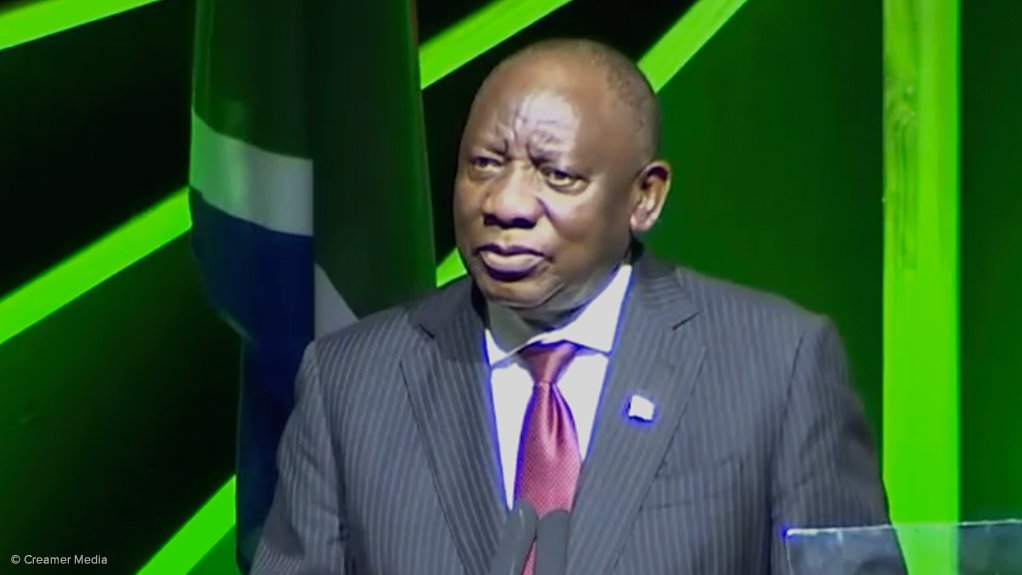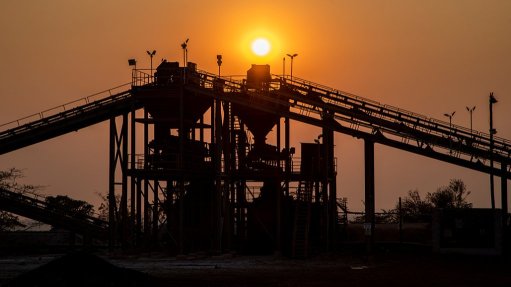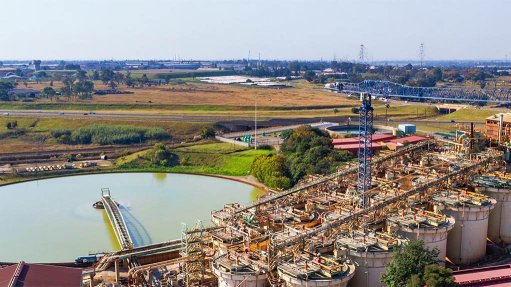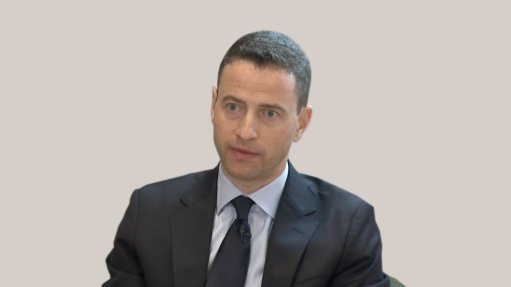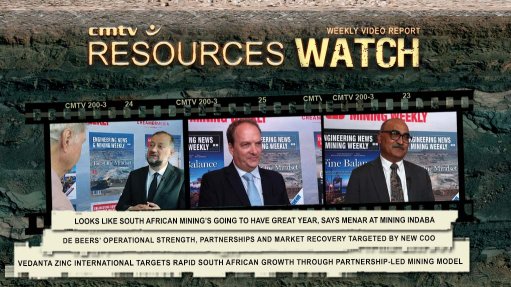South Africa’s mining industry now 39% black-owned, Mining Indaba hears
CAPE TOWN (miningweekly.com) – In 2004, the year South Africa’s far-reaching Mining Charter was first introduced, black ownership in South Africa’s globally recognised mining industry stood at a negligible 2%.
This has now leapt nearly 20 times higher to approximately 39%, South Africa President Cyril Ramaphosa highlighted in his well-attended, full-house opening address on day-one of the four-day Investing in African Mining Indaba in Cape Town which is being attended by close to 10 000 people.
“It’s fitting that the 30th Mining Indaba is taking place in the year that South Africa celebrates the 30th year of its democracy,” said Ramaphosa in outlining the significant transformation that South Africa’s mining industry has undergone in the last three decades, after being a pillar of South African's economic strength for one and a half centuries.
Mining continues to account for about 60% of South African exports by value.
Working with industry and labour, the President outlined how democratic government had been able to transform the sector, which was notorious for labour exploitation, human rights violations, and poor health and safety standards during the apartheid era.
Today, the rights of 476 000 people employed by the mining industry are protected and a legal regime confers responsibility on mining companies to provide quality services and promote development in communities where they operate.
There are also a number of employee share ownership schemes through which mineworker participation in mining companies is being promoted.
“We are all acutely aware that we face strong headwinds, and a number of persistent challenges are impeding mining performance.
"Globally, commodity price volatility, high energy prices, geopolitical tensions and a global cost of living crisis are playing a significant role in dampening the business operating environment,” said Ramaphosa.
"Domestically, the energy crisis and port and rail bottlenecks are putting serious pressure on miners’ operational costs. Illicit mining, cable theft and infrastructure vandalism place a further strain on mining output and returns.
“We’re committed to work hard and to work together to overcome these serious challenges,” the President added at the event, covered by Mining Weekly.
Last year, the South African government outlined four objectives to develop the sector, improve its global competitiveness and harness the global drive towards sustainable development.
The first was to achieve a secure supply of electricity and several measures to improve the performance of the existing generation fleet and to add new electricity capacity have been taken through the Electricity Action Plan.
The second objective of accelerating economic reforms has resulted in the removal of the licensing threshold for embedded generation, with a third of this capacity supplying the mining load.
The third objective of tackling illegal mining and damage to infrastructure by establishing a specialised police unit, working with the defence force, has resulted in a number of arrests, prosecutions and convictions of the perpetrators of this crime.
The State-owned mining technology agency Mintek has sealed 251 derelict mines and shafts, and closure of a further 352 shafts is targeted over the next three years.
Criminal activity, such as copper cable theft, has resulted in South Africa’s freight logistics system undergoing a process of rapid and fundamental change to improve its efficiency and position it for the future.
Working with the private sector under the auspices of the National Logistics Crisis Committee, the public sector is working to overcome the challenges with ports and rail, with the recently approved Freight Logistics Roadmap guiding this process.
“By introducing competition in freight rail operations, while maintaining State ownership of the routes, we will unlock massive new investment in South Africa’s rail system. This will support jobs in every sector of the economy, from mining to manufacturing to agriculture.
“Similarly, by upgrading and expanding our port terminals through innovative public-private partnerships, we aim to position South Africa as a leading player in global markets.
“As government we are alive to the reality that without bold, transformative reforms to the logistics sector, mining cannot flourish. We are working hard, in partnership with industry, to ensure this roadmap is implemented without delay,” Ramaphosa said.
Regarding last year’s commitment to put a new system in place to assist in the administration of mining rights, he added: “Now that we have a preferred bidder in place, we are confident that the speedy implementation of a modern world-class solution will clear the backlogs in prospecting and mining applications and pave the way for the development of new mines.
“The theme of this year’s Mining Indaba is about embracing the power of positive disruption. The transition to a low-carbon, climate-resilient economy, society and world is one of the most significant positive disruptions of our modern age.
“The vast majority of the minerals that are key to the global energy transition lie beneath the soil of our continent. These include manganese, iron-ore, copper, cobalt, nickel and platinum group metals.
“Africa has the potential to be the fulcrum of the global energy transition, with mining at its core.
“This Indaba must prioritise deliberations around how we can leverage these changes to breathe new life into mining, to strengthen mining value chains, and to enhance beneficiation.
“South Africa is pursuing a just energy transition – one that is at a pace and scale that our country can afford, and in a manner that ensures energy security and creates new opportunities for those affected.
"Our Just Energy Transition Investment Plan outlines a pathway to create new industries and support more livelihoods in the green economy.
“The delivery of this plan is premised on strong collaboration between government and all social partners. It cannot be overstated how crucial the mining sector is to the success of just outcomes, notably in regions like Mpumalanga," the President stated.
“We ask you to walk this journey with us through embedding just transition principles in your Social Labour Plan projects, community trust initiatives, and by driving innovative green technology development.
"Mining has a crucial role to play in building the economy of tomorrow. We look forward to deepening our collaboration with industry as we write a new chapter in the history of South African mining. A story of inclusion, growth, transformation and innovation – and one in which no-one is left behind,” Ramaphosa emphasised.
Article Enquiry
Email Article
Save Article
Feedback
To advertise email advertising@creamermedia.co.za or click here
Press Office
Announcements
What's On
Subscribe to improve your user experience...
Option 1 (equivalent of R125 a month):
Receive a weekly copy of Creamer Media's Engineering News & Mining Weekly magazine
(print copy for those in South Africa and e-magazine for those outside of South Africa)
Receive daily email newsletters
Access to full search results
Access archive of magazine back copies
Access to Projects in Progress
Access to ONE Research Report of your choice in PDF format
Option 2 (equivalent of R375 a month):
All benefits from Option 1
PLUS
Access to Creamer Media's Research Channel Africa for ALL Research Reports, in PDF format, on various industrial and mining sectors
including Electricity; Water; Energy Transition; Hydrogen; Roads, Rail and Ports; Coal; Gold; Platinum; Battery Metals; etc.
Already a subscriber?
Forgotten your password?
Receive weekly copy of Creamer Media's Engineering News & Mining Weekly magazine (print copy for those in South Africa and e-magazine for those outside of South Africa)
➕
Recieve daily email newsletters
➕
Access to full search results
➕
Access archive of magazine back copies
➕
Access to Projects in Progress
➕
Access to ONE Research Report of your choice in PDF format
RESEARCH CHANNEL AFRICA
R4500 (equivalent of R375 a month)
SUBSCRIBEAll benefits from Option 1
➕
Access to Creamer Media's Research Channel Africa for ALL Research Reports on various industrial and mining sectors, in PDF format, including on:
Electricity
➕
Water
➕
Energy Transition
➕
Hydrogen
➕
Roads, Rail and Ports
➕
Coal
➕
Gold
➕
Platinum
➕
Battery Metals
➕
etc.
Receive all benefits from Option 1 or Option 2 delivered to numerous people at your company
➕
Multiple User names and Passwords for simultaneous log-ins
➕
Intranet integration access to all in your organisation



